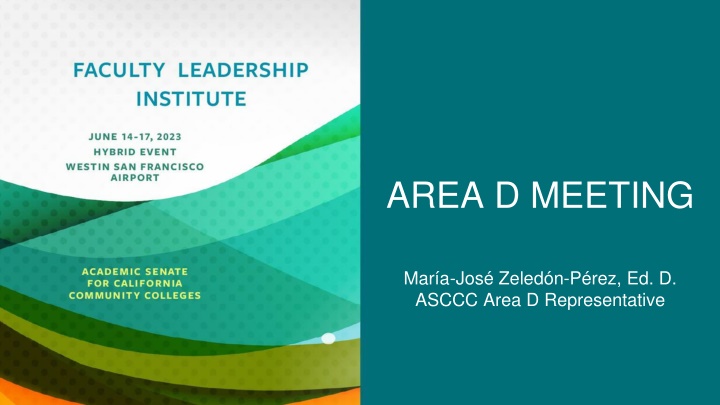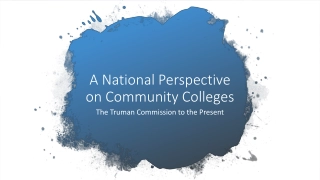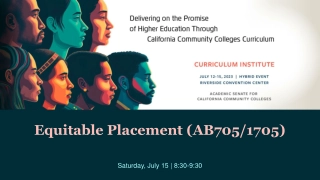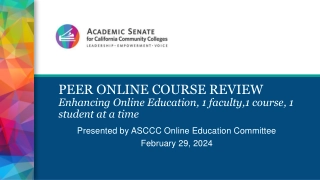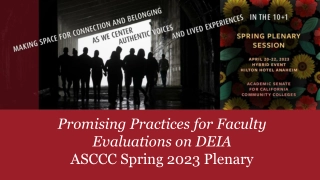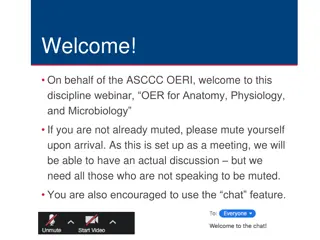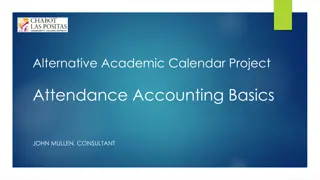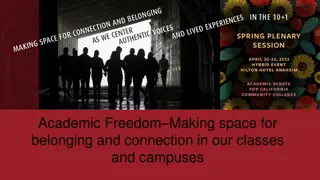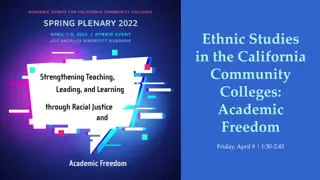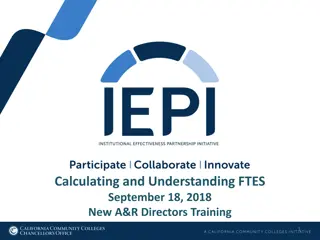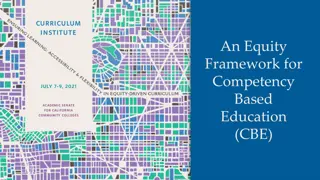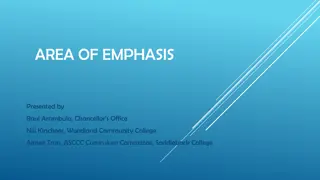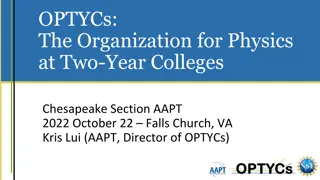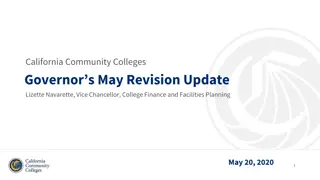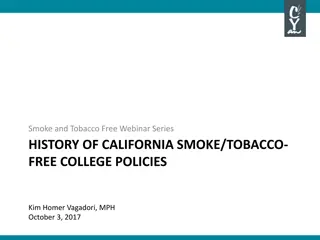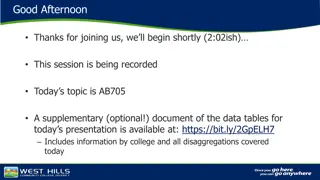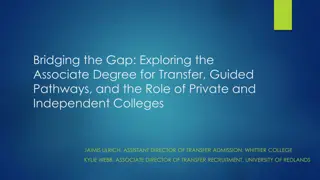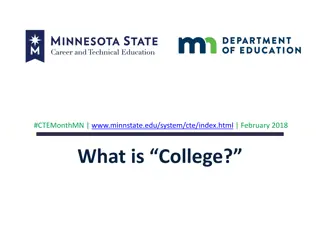Role of ASCCC Area D Representative in California Community Colleges
The ASCCC Area D Representative, Dr. María-José Zeledón-Pérez, plays a crucial role in representing 62,000 faculty and 2.4 million students in southern California community colleges. Their responsibilities include leading academic matters, coordinating area meetings, providing resources, and facilitating communication among local senate delegates. The Four Areas framework guides local senate representation to the Executive Committee of the Academic Senate for California Community Colleges.
Download Presentation

Please find below an Image/Link to download the presentation.
The content on the website is provided AS IS for your information and personal use only. It may not be sold, licensed, or shared on other websites without obtaining consent from the author.If you encounter any issues during the download, it is possible that the publisher has removed the file from their server.
You are allowed to download the files provided on this website for personal or commercial use, subject to the condition that they are used lawfully. All files are the property of their respective owners.
The content on the website is provided AS IS for your information and personal use only. It may not be sold, licensed, or shared on other websites without obtaining consent from the author.
E N D
Presentation Transcript
AREA D MEETING Mar a-Jos Zeled n-P rez, Ed. D. ASCCC Area D Representative
Introductions The Four Areas Area Meeting Review Resolutions Resources AGENDA 2
ASCCC Area D Representative Dr. Mar a-Jos Zeled n-P rez The elected Area D Representative serves as both a member of the executive board of the Academic Senate for California Community Colleges and serves 62,000 faculty and 2.4 million students in all academic and professional matters. The Area D Representative leads a dynamic team of educators located in southern California and include community college districts in Imperial, Los Angeles Orange, Riverside, San Bernardino and San Diego counties. It includes the largest number of college and district academic senates from among the Academic Senate for California Community College s four geographic regions: The colleges in Area D range from large urban (Long Beach City College, San Diego City College) to small and very rural (Barstow, Copper Mountain, Palo Verde College). Area D includes some of the oldest colleges in the California community college system: Fullerton College was the third to open in the state, tied with Bakersfield opening in 1913, and San Diego opened the following year. 3
This four-area grouping is the formal basis for local senate representation to the Executive Committee of the Academic Senate for California Community Colleges. The Area Representatives are responsible for coordinating two area meetings each year. At these meetings, held each fall and spring prior to the upcoming plenary session, local senate delegates meet at a college in their area or via zoom. The Four Areas The groups discuss matters of concern to their areas as well as review proposed resolutions to be voted on during session. Area A: Stephanie Curry Area B: Karen Chow Area C: Erik Reese Area D: Mar a-Jos Zeled n-P rez 4
More about what the Area Rep does Provide information about Academic Senate activities and resources Provide communication to the field Listservs Help senate presidents/delegates prepare for Plenary Facilitate Area Meetings before and at Plenary Consult with or visit local senates. Requests for such visits should be forwarded through the Academic Senate Office at info@asccc.org. You can access a list of all colleges by Area here: Area Map and College Listing 5
ASCCC The Executive Committee is comprised of 14 representatives elected by the delegates each year in Spring and the Executive Director (ex officio member). As noted in the bylaws, this group adopts procedures, implements policies adopted at the plenary sessions, transacts business, and performs other functions that are not inconsistent with the intent, purposes, and provisions of the Bylaws and Senate Rules. The Executive Committee meets every month except July. 6
What we do as the ASCCC team The Area D Representative and the ASCCC Executive Board work to empower faculty to engage in local and statewide dialog and take action for continued improvement of teaching, learning, and faculty participation in governance. Representation Matters The representation of the governing body of an organization is critically important, as diverse representation provides more voices, critical to make collective change. The ASCCC remains committed to advancing inclusion, diversity, equity, antiracism, and accessibility. 7
AREA D 33 Colleges Barstow College Norco College Chaffey College Coastline College Copper Mountain College North Orange Continuing Education Orange Coast College Palo Verde College Crafton Hills College Cuyamaca College Cypress College Palomar College Riverside City College Saddleback College College of the Desert Fullerton College Golden West College San Bernardino Valley College San Diego City College San Diego Continuing Education Grossmont College Imperial Valley College Irvine Valley College San Diego Mesa College San Diego Miramar College Santa Ana College Long Beach City College MiraCosta College Moreno Valley College Santiago Canyon College Southwestern College Mt. San Jacinto College Victor Valley College 9
AREA A 29 Colleges American River College Porterville College Bakersfield College College of the Redwoods Butte College Reedley College Cerro Coso College Sacramento City College Clovis Community College San Joaquin Delta College Columbia College College of the Sequoias Cosumnes River College Shasta College Feather River College Sierra College Folsom Lake College College of the Siskiyous Fresno City College Taft College Lake Tahoe Community College West Hills College Coalinga Lassen College West Hills College Lemoore Madera Community College Woodland Community College Merced College Yuba College Modesto Junior College 10
AREA B 29 Colleges College of Alameda Berkeley City College Cabrillo College Canada College City College of San Francisco Chabot College Contra Costa College De Anza College Diablo Valley College Evergreen Valley College Foothill College Gavilan College Hartnell College Laney College Las Positas College Los Medanos College College of Marin Mendocino College Merritt College Mission College Monterey Peninsula College Napa Valley College Ohlone College San Jose City College College of San Mateo Santa Rosa Junior College Skyline College Solano College West Valley College 11
AREA C 26 Colleges Allan Hancock College Antelope Valley College College of the Canyons Cerritos College Citrus College Compton College Cuesta College East Los Angeles College El Camino College Glendale College Los Angeles City College Los Angeles Harbor College Los Angeles Mission College Los Angeles Pierce College Los Angeles Southwest College Los Angeles Trade Technical College Los Angeles Valley College Moorpark College Mt. San Antonio College Oxnard College Pasadena City College Rio Hondo College Santa Barbara City College Santa Monica College Ventura College West Los Angeles College 12
What do we do in an Area Meeting? President/Vice President Report Pre-Session Resolutions Review Newly Proposed Resolutions Area Concerns Special Program/Host Highlight Community Building 13
Why Resolutions? Resolution development is the primary and formal mechanism for setting policy of the Academic Senate. Resolutions identify and record the will of the academic senates of the California community colleges. The Academic Senate relies on formal resolutions to set direction for the organization as a whole. Members of the Academic Senate Executive Committee and its standing and ad hoc committees implement adopted resolutions to respond to issues, to conduct its work, and to take action. 14
Whats the Resolution Process? Pre-Session Resolutions ASCCC Executive and Committees Area Meetings New Resolutions Delegates and local senate representatives at Plenary Amendments Review and discuss in Area Meetings and Plenary Amendment Sheets four delegate signatures Watch for DEADLINES and Mandatory Meetings! 15
ASCCC Leadership and Resolutions Resources Leadership Resources Senate Delegate Roles and Responsibilities Resolutions Handbook Resolution Writing And General Advice Resolutions ASCCC 10+1 Flyer 16
ASCCC General Resources Bookmark ASCCC.org ASCCC website Volunteer Application to Serve on a Committee ASCCC Local Senates Handbook Consider a Local Senatel Visit Sign-up for ASCCC Listservs ASCCC Bylaws 17
Thank You! Gracias! Contact Information Mar a-Jos Zeled n-P rez, Ed.D. ASCCC Area D Representative mzeledon@sdccd.edu Email me anytime! 18
